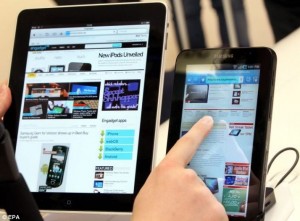 Apple won a split-decision in a German court against Samsung’s Galaxy tablets. The Dusseldorf Higher Regional Court banned Samsung’s smaller Galaxy Tab 7.7 in all EU countries, but the iPad maker lost an appeal to block sales of the Korean company’s larger Galaxy Tab 10.1N. The ruling in favor of Samsung confirmed “that the Galaxy 10.1N does not infringe” upon Apple patents, the rival firm announced.
Apple won a split-decision in a German court against Samsung’s Galaxy tablets. The Dusseldorf Higher Regional Court banned Samsung’s smaller Galaxy Tab 7.7 in all EU countries, but the iPad maker lost an appeal to block sales of the Korean company’s larger Galaxy Tab 10.1N. The ruling in favor of Samsung confirmed “that the Galaxy 10.1N does not infringe” upon Apple patents, the rival firm announced.
In February, the same German court ruled that design changes made to the Galaxy 10.1N was enough to withdrawal the initial injunction won by Apple. Apple was unable to change the court’s thinking on appeal.
However, Apple was able to further limit sales of the smaller Galaxy 7.7 tablet from the original ban in Germany to now across all EU member states.
“We will continue to take all available measures, including legal action, to protect our intellectual property rights and defend against Apple’s claims to ensure our products remain available to consumers throughout the European Union,” Samsung said in a statement to the tech blog The Verge.
June 5th: The AI Audit in NYC
Join us next week in NYC to engage with top executive leaders, delving into strategies for auditing AI models to ensure fairness, optimal performance, and ethical compliance across diverse organizations. Secure your attendance for this exclusive invite-only event.
Besides all of this preliminary back-and-forth, the two companies are still scheduled to face off in a trial in German courts. The German court’s rulings on the two injunctive measures appear to throw new focus on Samsung’s comments Monday that Apple ‘prefers lawsuits over licensing.’
Additionally, the split decision in Germany is just the latest round in a long-running battle between Apple and Samsung as the two competitors vie to control the hottest mobile sectors: tablets and smartphones. As we showed yesterday, Apple has had more courtroom wins aimed at the U.S. market, while European courts have not been so overwhelmingly favorable to Apple’s arguments.
